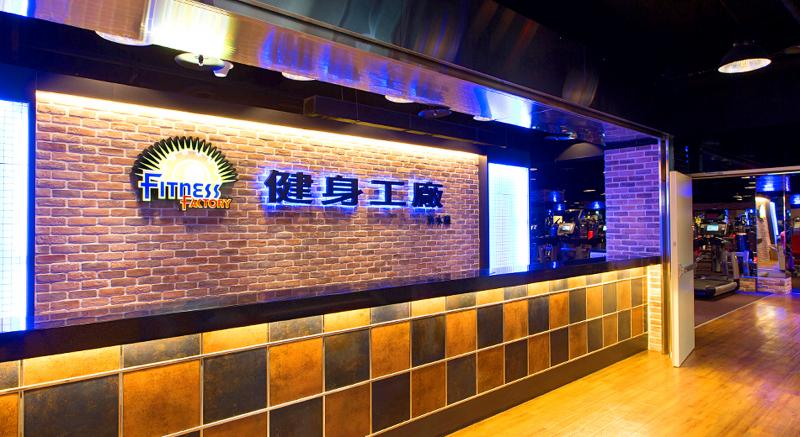All gyms of the Fitness Factory (健身工廠) chain are to remain closed until Friday next week in accordance with disease prevention measures, Power Wind Health Industry Inc (柏文健康事業), the chain’s operator, said yesterday, citing a COVID-19 level 3 alert in Taipei and New Taipei City.
All other gyms it operates, including Body Workshop (纖養工房), S Klub (兒童體適能俱樂部), Crazy Jump (肖跳), Let’s Roll (滾吧) and Kill Zone (鐳射戰場) gyms, would also remain closed, it said
“The 14-day suspension of all gyms operated by Power Wind will affect revenue for this month,” it said in a regulatory filing, adding that the firm is in “a strong financial condition.”

Photo courtesy of Power Wind Health Industry Inc via CNA
As of March 31, the company’s cash and cash equivalents reserves had reached NT$1.28 billion (US$45.7 million), Power Wind said, adding that it added NT$347.71 million to the reserves in the first quarter.
Contract liabilities, such as pre-paid income of monthly fees and pre-paid income of personal training classes, have for a long time been well-controlled, it said.
“The temporary suspension has no significant influence on the company’s financial condition,” Power Wind said.
Revenue expanded 23.82 percent year-on-year to NT$323.84 million last month thanks to higher recreational sports service sales and athletic health service sales, it said.
Cumulative revenue in the first four months of this year grew 8.82 percent year-on-year to NT$1.24 billion, the filing showed.
However, net profit for the first quarter fell 19.85 percent to NT$90.69 million, from NT$113.15 million a year earlier, while earnings per share dropped to NT$1.28, from NT$1.6 last year, it showed.
Separately on Friday, fitness equipment maker Dyaco International Inc (岱宇國際) reported net profit of NT$268.19 million for the first quarter, compared with NT$3.29 million a year earlier, thanks to surging sales, better expense control and rising capacity utilization of its production bases in Taiwan and China.
Earnings per share were NT$2.1, up from losses per share of NT$0.01 during the same period last year, Dyaco said in a statement.
Gross margin reached 36.05 percent in the first quarter, while operating margin climbed to 8.76 percent, compared with 28.04 percent and minus-0.25 percent a year earlier, the firm said.
Cumulative sales in the first four months of this year climbed 103.35 percent year-on-year to NT$4.83 billion, thanks to a steady increase in sales of equipment of its Sole Fitness, Xterra Fitness and Spirit Fitness brands, as well as strong orders from the US, it said.

Taiwan Semiconductor Manufacturing Co (TSMC, 台積電) secured a record 70.2 percent share of the global foundry business in the second quarter, up from 67.6 percent the previous quarter, and continued widening its lead over second-placed Samsung Electronics Co, TrendForce Corp (集邦科技) said on Monday. TSMC posted US$30.24 billion in sales in the April-to-June period, up 18.5 percent from the previous quarter, driven by major smartphone customers entering their ramp-up cycle and robust demand for artificial intelligence chips, laptops and PCs, which boosted wafer shipments and average selling prices, TrendForce said in a report. Samsung’s sales also grew in the second quarter, up

LIMITED IMPACT: Investor confidence was likely sustained by its relatively small exposure to the Chinese market, as only less advanced chips are made in Nanjing Taiwan Semiconductor Manufacturing Co (TSMC, 台積電) saw its stock price close steady yesterday in a sign that the loss of the validated end user (VEU) status for its Nanjing, China, fab should have a mild impact on the world’s biggest contract chipmaker financially and technologically. Media reports about the waiver loss sent TSMC down 1.29 percent during the early trading session yesterday, but the stock soon regained strength and ended at NT$1,160, unchanged from Tuesday. Investors’ confidence in TSMC was likely built on its relatively small exposure to the Chinese market, as Chinese customers contributed about 9 percent to TSMC’s revenue last

LOOPHOLES: The move is to end a break that was aiding foreign producers without any similar benefit for US manufacturers, the US Department of Commerce said US President Donald Trump’s administration would make it harder for Samsung Electronics Co and SK Hynix Inc to ship critical equipment to their chipmaking operations in China, dealing a potential blow to the companies’ production in the world’s largest semiconductor market. The US Department of Commerce in a notice published on Friday said that it was revoking waivers for Samsung and SK Hynix to use US technologies in their Chinese operations. The companies had been operating in China under regulations that allow them to import chipmaking equipment without applying for a new license each time. The move would revise what is known

UNCERTAINTY: A final ruling against the president’s tariffs would upend his trade deals and force the government to content with billions of dollars in refunds The legal fight over US President Donald Trump’s global tariffs is deepening after a federal appeals court ruled the levies were issued illegally under an emergency law, extending the chaos in global trade. A 7-4 decision by a panel of judges on Friday was a major setback for Trump, even as it gives both sides something to boast about. The majority upheld a May ruling by the Court of International Trade that the tariffs were illegal. However, the judges left the levies intact while the case proceeds, as Trump had requested, and suggested that any injunction could potentially be narrowed to apply